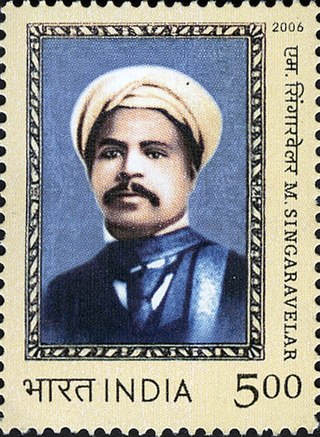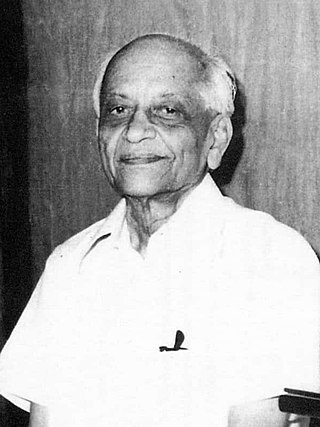
The Communist Party of India (CPI) is the oldest communist party in India. The CPI was founded in modern-day Kanpur on 26 December 1925.

Muzaffar Ahmad was an Indian-Bengali politician, journalist and a co-founder of the Communist Party of India.

Puran Chand Joshi, one of the early leaders of the communist movement in India. He was the general secretary of the Communist Party of India from 1935 to 1947.

Malayapuram Singaravelu, also known as M. Singaravelu and Singaravelar, was a pioneer in more than one field in India. In 1918, he founded the first trade union in India. On 1 May 1923 he organised the first ever celebration of May Day in the country. Singaravelar was a major leader of the Indian independence movement, initially under the leadership of Gandhi, but later, joining the budding communist movement. In 1925, he became one of the founding fathers of the Communist Party of India; and chaired its inaugural convention in Kanpur. Though the British Government arrested him along with other leaders on charges of conspiring to wage war against the Crown, he was set free, soon after, on account of his failing health. Singaravelar was also a path-breaking social reformer who in his early life took to Buddhism, seeing it as a weapon against the evil of untouchability, which was particularly severe in the 19th-century India. He was also in the forefront of Self respect movement, in the Madras Presidency that fought for equal rights for backward castes. Though in his advanced years, he withdrew from active politics, Singaravelar remained a staunch advocate of the causes he had pioneered till his death at the age of 85.

Shripad Amrit Dange was an Indian politician who was a founding member of the Communist Party of India (CPI) and a stalwart of Indian trade union movement. During the 20th century, Dange was arrested by the authorities for communist and trade union activities and was jailed for an overall period of 13 years.
Shaukat Usmani (Maulla Bux Usta) (1901–1978) was an early Indian communist, who was born to artistic USTA family of Bikaner and a member of the émigré Communist Party of India (Tashkent group), established in Tashkent in 1920, and a founding member of the Communist Party of India (CPI) formed in Kanpur in 1925. He was also the only candidate to the British Parliament contesting elections, while he was residing in India—that too in a prison. He was sentenced to a total of 16 years in jail after being tried in the Kanpur (Cawnpore) Case of 1923 and later the Meerut Conspiracy Case of 1929.
Socialism in India is a political movement founded early in the 20th century, as a part of the broader movement to gain Indian independence from colonial rule. The movement grew quickly in popularity as it espoused the causes of India's farmers and labourers against the zamindars, the princely class and the landed gentry. After independence and until the early 1990s, socialism shaped some economic and social policies of the Indian government, although they mostly followed the principles of dirigisme. After this period, India moved towards a more market-based economy.
Labour Kisan Party of Hindustan was a political party in India. The party was founded by Singaravelu Chettiar on 1 May 1923 in Madras. This was the first May Day celebration in India. This was also the first time the red flag was used in India.
The Workers and Peasants Party (WPP) (also known as the Kirti Kisan Party) was a political party in India, which worked inside the Indian National Congress in 1925–1929. It became an important front organisation for the Communist Party of India and an influential force in the Bombay labour movement. The party was able to muster some success in making alliances with other left elements inside the Congress Party, amongst them Jawaharlal Nehru. However, as the Communist International entered its 'Third Period' phase, the communists deserted the WPP project. The WPP was wound up, as its leadership was arrested by the British authorities in March 1929.

Abaninath Mukherji was an Indian communist and émigré based in the Soviet Union who co-founded the Communist Party of India. His name was often spelt Abani Mukherjee.

Philip Spratt was a British writer and intellectual. Initially a communist sent by the British arm of the Communist International (Comintern), based in Moscow, to spread Communism in India, he subsequently became a friend and colleague of M.N. Roy, founder of the Communist parties in Mexico and India, and along with him became a communist activist.
Communism in India has existed as a social or political ideology as well as a political movement since at least as early as the 1920s. In its early years, communist ideology was harshly suppressed through legal prohibitions and criminal prosecutions. Eventually, communist parties became ensconced in national party politics, sprouting several political offshoots.

The Meerut Conspiracy Case was a controversial court case that was initiated in British Raj in March 1929 and decided in 1933. Several trade union ists, including three Englishmen, were arrested for organizing an Indian railway strike. The British government convicted 27 leftist trade union leaders under a lawsuit. The trial immediately caught attention in England, where it inspired the 1932 play Meerut by a Manchester street theatre group, the Red Megaphones, highlighting the detrimental effects of colonisation and industrialisation.

In 1964, a major split occurred in the Communist Party of India. The split was the culmination of decades of tensions and factional infighting. When India became independent in 1947, differences arose of how to adapt to the new situation. As relations between the Nehru government and the Soviet Union improved, a faction that sought cooperation with the dominant Indian National Congress emerged within CPI. This tendency was led by S.A. Dange, whose role in the party hierarchy became increasingly controversial. When the Sino-Indian War broke out in 1962 Dange's opponents within CPI were jailed, but when they were released they sought to challenge his leadership. In 1964 the party was finally divided into two, with the left faction forming the Communist Party of India (Marxist). The split had a lot of regional variations. It also impacted other organizations, such as trade union and peasant movements. The split has been studied extensively by scholars, who have sought to analyze the various domestic and international factors involved.

The Communist Party of India is one of the oldest political parties in India. However within the Indian communist movement, there is a controversy on what date to consider as the foundation date of the party. The early history of the Indian communist movement was tumultuous and complicated. An Indian communist group emerged in Tashkent in 1920, led by M.N. Roy. From 1921 onward small local communist groups began to emerge inside India. A national communist conference was held in Kanpur in 1925. The efforts to build a Communist Party organization inside India were hampered by arrests and court cases against leading party members.

Ghulam Ambia Khan Lohani, stylized as G.A.K. Lohani, or Luhani, was a Bengali revolutionary, journalist, professor, and founder of the Communist Party of India, who struggled against British rule.
Satyabhakta who used the mononym, was one of the founders of the Communist Party of India December 25-28, 1925 at Kanpur.
Communists were actively involved in Indian independence movement through multiple series of protests, strikes and other activities. It was a part of revolutionary movement for Indian independence. Their main thrust was on organising peasants and working classes across India against the British and Indian capitalists and landlords.
Communist movements in India refers to the various social and political movements led by communists in India. Communism in India has existed since the 1920s. Some of the major events are listed below.










